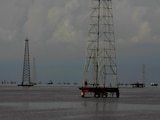Tesla halted production at its German factory Tuesday after high-voltage lines supplying the carmaker's only European plant were set on fire in an act of "sabotage" claimed by a far-left group.
Emergency services were called in the early hours of Tuesday to reports of a burning electricity pylon southeast of Berlin, close to the Tesla plant.
The blaze was extinguished but damage to the lines knocked out power to the factory, as well as surrounding villages.
After police said they had launched an investigation into suspected arson the act was claimed by far-left activists from the so-called Vulkangruppe (Volcano Group).
"With our sabotage, we have set ourselves the goal of achieving the biggest possible blackout of the Gigafactory," the group said in a statement posted on a far-left website.
The group highlighted concerns about the environmental impact of the plant and the local water supply.
"We feel connected to all the people who won't let Tesla turn the tap off," the group said.
Michael Stuebgen, interior minister for Brandenburg state, said that if arson was confirmed, it would be "a perfidious attack on our electricity infrastructure".
"Thousands of people have been cut off from their basic supply and put in danger. The rule of law will react to such an act of sabotage with the utmost severity."
Controversial expansion
Tesla said the production facilities at the Gruenheide plant were in a "safe state" after the shutdown, and workers had been sent home.
"We are in close contact with the authorities and of course (electricity supplier) Edis. We are currently unable to say when production can be expected to resume," the company said in a statement.
The power outage is the latest problem to hit the factory.
In January, most production was halted at the site for two weeks due to a shortage of parts following shipping delays caused by Yemeni rebel attacks in the Red Sea, a vital trade route.
Tesla's German plant started production in 2022 following an arduous two-year approval and construction process dogged by administrative and legal obstacles.
Tesla wants to expand the site by 170 hectares (420 acres) and boost production up to one million vehicles annually to feed Europe's growing demand for electric cars and take on rivals who are shifting away from combustion engine vehicles.
But the plans have annoyed local residents, who voted against the project in a non-binding ballot last month.
After the vote, Tesla said it might have to rethink the plans.
"We recognise that the citizens of Gruenheide have concerns in connection with the planned expansion of the site," the company said.
Forest camp
Environmental activists opposed to the expansion of the factory run by Elon Musk's company recently set up a camp in a wooded area near the plant.
Protestors at the forest camp, situated in an area of forest that the carmaker will have to raze if the expansion goes ahead, share many of the locals' objections to the factory.
As well as deforestation, the activists say there is a threat to local drinking water supplies.
Stop Tesla, the group behind the protest camp, said Tuesday it had "no information" about the cause of the fire and shared its "solidarity with the workers at Tesla and the local residents".
Tesla has plenty of headaches elsewhere.
In Sweden, a strike by Tesla maintenance and repair workers has lasted more than four months over its refusal to sign a collective wage agreement.
In January, the company reported lower fourth-quarter operating profits despite higher revenues, while warning of slower volume growth this year.
(Except for the headline, this story has not been edited by NDTV staff and is published from a syndicated feed.)















